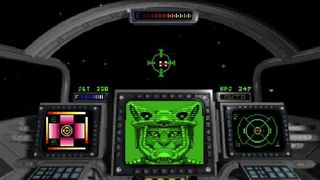Wing Commander: Privateer made us fly a practical joke with wings and we loved it
Reinstall.

Reinstall invites you to join us in revisiting classics of PC gaming days gone by. This week, we take a spin through the rich, interplanetary world of Wing Commander: Privateer. And blow significant portions of it up, of course.
Confession time: I don't like Elite. Never did. It's a huge, empty, boring universe, existing solely for you to fly tedious trade routes from A to B, and occasionally be blown up in rubbish fights with other ships. Where's the action? Where's the adventure? Where's the excitement of being a space smuggler?
I'll tell you: it's in Privateer. At least, it was. Like the other early Wing Commander games, its use of sprites instead of primitively shaded polygons made for gloriously cinematic space battles back in the early '90s. Their 320x200 pixel graphics blown up on a modern LCD mean much more squinting. See those huge cockpits? You can't hide them. For your first few missions, the biggest challenge is working out if you're meant to use your viewscreen or post a letter through it. Some games successfully hide their age. Privateer is not one of them.
The hook is still there though. You start out as an independent trader flying a bucket of bolts that's not so much a cargo ship as a practical joke with wings. Then you do whatever you like. Trade between the different bases to raise money. Take on randomly generated missions against space pirates, or become a pirate yourself. Save up to join the Merchant's Guild. Tool up your ship, piece by piece, while remembering you have pay for everything, up to and including individual missiles.
Unlike Elite, or many other space-trading games, Privateer understands the importance of creating a world that feels like more than a few menu screens, even if that's all it boils down to. Each planet type has a unique look. Every nav point you visit could be home to anything from a trader who simply signals hello, to a battle already in progress you can either take part in or afterburner straight through. The addition of a speech pack (included in the GOG release, along with the expansion pack, Righteous Fire) helps a lot here, making space feel like a much less lonely place.
Having character portraits and proper conversations does a similar job while planetside, with just enough differences that the universe doesn't seem full of clones. Out in deep space, every faction has its claws into different systems, from the safe Confed-controlled trading hubs to pirate systems like Pentonville, and even a few where you'll bump into the Kilrathi—Wing Commander's feline baddies—whose genocidal war with humanity doesn't particularly concern you as a freelance trader. The different factions all keep track of your kills, dramatically affecting the reception you'll get when you jump into their sectors to carry out business.

This sense of character is something the Wing Commander series did better than any other game, from X-Wing's very sterile aesthetics to Freespace's stripped down “Alpha 1" callsigns and to-the-point mission briefings. Technically the trading is no more intricate than Elite's, and the space combat little more than jousting with plasma guns.
The biggest gaming news, reviews and hardware deals
Keep up to date with the most important stories and the best deals, as picked by the PC Gamer team.
The added details make it so much easier to pretend though, to imagine a busy universe of snarling pirates and smelly deep-space truckers. If you'd played the Wing Commander games, it also didn't hurt that after several campaigns of taking orders and flying missions, you were now off the leash in that big wide universe, with the liberty to ignore even the scripted plot missions in favor of running a shipment of drugs past the good guys. Freedom doesn't have to be subtle to be enjoyed.

Privateer was followed up by Privateer 2: The Darkening, which bore little resemblance to its predecessor for the simple reason that the name was slapped on late in development. It's not a very good game, though its bizarre sci-fi world had some famous names: Clive Owen as the star, along with Christopher Walken. There were plans for a Privateer Online, but publisher EA opted to back Westwood's failed Earth and Beyond instead, and the project was unceremoniously cancelled.
Today, Privateer's legacy lives on only in fan projects like Gemini Gold, though it remains one of the more fondly remembered slices of the Wing Commander universe. You need a certain level of tolerance to dive into it cold, but if you're a fan of the series who missed it back in the day, it's easily the spin-off most worth checking out.
Most Popular

